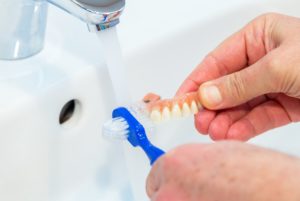 Dentures provide a comfortable, convenient method to treat severe tooth loss. Thanks to various advancements in dentistry, your dentures should fit your smile like a glove as suction holds them in place. However, if you have a big event coming up, you might worry about your teeth slipping or falling out. Whether you need a little extra security, or your dentures don’t fit as snuggly as before, an adhesive can be helpful, but only if it’s used correctly. Here are a few tips you should know when using a denture adhesive.
Dentures provide a comfortable, convenient method to treat severe tooth loss. Thanks to various advancements in dentistry, your dentures should fit your smile like a glove as suction holds them in place. However, if you have a big event coming up, you might worry about your teeth slipping or falling out. Whether you need a little extra security, or your dentures don’t fit as snuggly as before, an adhesive can be helpful, but only if it’s used correctly. Here are a few tips you should know when using a denture adhesive.
Do You Need a Denture Adhesive?
A denture adhesive is a product designed to temporarily attach your dentures to your gums. It can provide extra stability while creating a seal to prevent foods particles from getting under your dentures. Many people don’t need an adhesive, but others like to have a barrier between their gums and dentures. Others enjoy added peace of mind knowing their teeth aren’t going to fall out when laughing or eating.
Besides personal preferences, your denture dentist may recommend adding an adhesive to alleviate issues caused by decreased saliva production. Dry mouth can affect the suction between your gums and denture.
How to Use Denture Adhesives
There are a variety of denture adhesives on the market, but not all are right for you. You can choose from pastes, powers, and strips to find one that fits your needs. When considering an adhesive, your denture dentist will recommend avoiding those containing zinc to prevent medical problems. You may have to try multiple brands or types to find an adhesive that works best. You can decrease trial and error by using the adhesive correctly:
1. Oral Hygiene Routine: Even if you’ve lost all your natural teeth, you still need to care for your mouth to remove food particles and plaque. You should also brush and rinse your dentures before wearing them for the day.
2. Applying the Adhesive: Follow the instructions on the packaging to apply the adhesive to your denture. You may have to experiment with the amount used to get the best fit.
3. Position Your Dentures: Carefully position your dentures in your mouth and hold them in place for a few seconds.
At the end of the day, remove any adhesive from your dentures and mouth before going to bed. Don’t forget to soak your dentures in an overnight cleaning solution to remove anything left behind by your toothbrush.
Say Goodbye to Slipping Dentures
If you’re not satisfied after adding an adhesive, you don’t have to settle for anything less than the best. Ask your dentist about adding the security of dental implants to your smile.
About Dr. Kevin Labosky
Dr. Labosky earned his dental degree from the Temple University School of Dentistry and regularly peruses continuing education in advanced specialties, like dentures and dental implants. As a member of the American Dental Association and the Pennsylvania Dental Association, he has the qualifications you can trust. Contact our office today to schedule your consultation.



